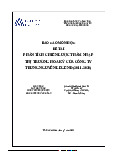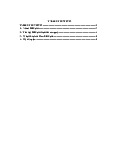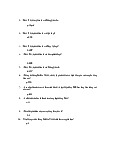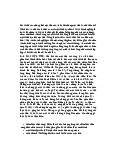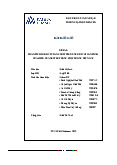







Preview text:
B. Constructing and Managing Brand Image
Positioning and building a brand is a major challenge for small businesses
with limited resources and budgets. However, there have been many
successful brands around the world that have turned their small retail stores
into renowned global chains. One notable example is UNIQLO, a fashion
brand from Japan. UNIQLO's success can be attributed to its commitment to
innovation, company culture, and brand identity.
"Uniqlo is a modern Japanese company that inspires the world in the
everyday clothing segment," that is the brand's clear vision. Unlike its
competitors, the company's strategy does not follow fashion trends like
other brands. Instead, Uniqlo focuses on simplicity, essential and popular
products that allow customers to mix them with their own personal style. To
create differentiation, the brand has emphasized unique features in its
materials: HeatTech, LifeWear, and AIRism. Uniqlo provides a distinctive
shopping experience by effectively managing its stores, fostering a positive
employee culture, and offering unique shopping experiences for customers.
Uniqlo aims to become the world's largest clothing retailer by 2020, with a
revenue target of $27.6 billion. This goal is primarily based on expanding its
market in the US, China, and through online sales. If Uniqlo achieves this
ambitious target, it will surpass Inditex (the parent company of Zara) as the
leading global apparel company. CLEAR BRAND MESSAGE
The biggest challenge for any successful brand is to deliver a clear and
consistent brand message that effectively communicates the brand's values.
Uniqlo has successfully achieved this by emphasizing the value of high-
quality, affordable, and basic clothing. Additionally, the brand has built a
strong distribution system to effectively convey this message.
Uniqlo has successfully achieved a clear and consistent brand message by
integrating all stages of the design, production, and distribution processes
within their system. This allows the company to respond to customer demand
based on actual purchases made in their store network, saving costs on
excess production or unnecessary expenses. By focusing on producing core
products using specific types of fabric, Uniqlo can consolidate its fabric
purchases into large orders, enabling greater negotiation power with suppliers
and ultimately translating into lower prices for customers. This integrated
approach ensures that Uniqlo can deliver high-quality, affordable, and basic
clothing consistently across its stores.
As the person who constructed UNIQLO Vietnam from the very beginning, Mr.
Osamu Ikezoe believes that Vietnam itself has altered his perception of
leadership. 'I have always asked myself what I can do for those around me.'
Life in Vietnam has also instilled in him the habit of seeking opportunities in
challenges, a factor that has helped him guide the brand through the
challenging phases of the pandemic.
“I want to send all my customers my sincerest gratitude. I am also very
grateful to all UNIQLO employees, who always try their best to support
customers and bring customers the best experience." He also thanked partner
companies and businesses around UNIQLO's stores for working with the
brand to build a more developed and convenient Vietnam.
In addition, silent actions like donating face masks, AIRism, DRY-EX
garments to healthcare professionals during the pandemic, organizing 'Kind
Green Markets' to connect Vietnamese farmers with new customer
opportunities, volunteer missions to distribute warm clothing to
disadvantaged children in remote mountainous areas through the
RE.UNIQLO initiative, have all demonstrated UNIQLO's commitment.
The goal is to become the most responsible fashion brand
Aiming to become the most responsible fashion brand, UNIQLO, after its
dedicated efforts and success over the past three years, will continue to
expand its stores to meet the diverse needs of different customer segments in Vietnam.
UNIQLO will also continue to collaborate with local partners, from
production and supply chain management to businesses and
organizations, to develop in harmony with Vietnam's overall growth.
Building and nurturing a talented Vietnamese workforce is an integral part
of UNIQLO's development journey. UNIQLO is not only increasing its
number of employees but also placing a special emphasis on building a
young talent pool in Vietnam to train them into future global leaders.
Currently, 75% of UNIQLO's store managers across the entire system and
2 regional managers are Vietnamese personnel. Additionally, 50% of
leadership positions at UNIQLO are held by women. These are all
impressive figures from a human resources perspective.
Since October 2022, UNIQLO officially began recruiting individuals with
disabilities through collaborations with social organizations, aiming to
provide equal opportunities for integration, work, and contribution based on
their abilities. Building upon these efforts, Mr. Osamu Ikezoe also
expressed determination and commitment to pursuing long-term human
resource development goals at UNIQLO.
In the end, UNIQLO will continue to strive to become the most responsible
fashion brand globally and locally, with sustainability goals for 2030 set by
Fast Retailing Group. These goals include reducing greenhouse gas
emissions by 90% and increasing the use of recycled materials in products
to about 50% within the scope of the entire group.
"With the journey we have undertaken and the continuous support of
customers and local partners, we believe in the bright future of UNIQLO
Vietnam in the time ahead," added Mr. Osamu.
C. PRODUCT STRATEGY AND BUSINESS MODEL
The product factor, diversity, and environmental friendliness are the
elements that create differentiation.
With the 'Adopting Local Practices' strategy, Uniqlo in Dong Khoi particularly
focuses on offering numerous products designed exclusively for the
Vietnamese market. Additionally, they have launched a custom T-shirt
printing service that greatly piques customers' interest. Meanwhile, the
highlight at Uniqlo Vincom Pham Ngoc Thach is the renowned entire product
line of UT (Uniqlo T-shirt), displayed in a dedicated area. Within this display
area, you can find the UT Mickey Stands Vietnam collection, which
combines Uniqlo's exclusive patterns with distinctively Vietnamese elements
such as conical hats and lotus flowers. This collection is exclusively created
for the Vietnamese market. In addition, they have also introduced a
collection of 20 endearing patterns closely reflecting the daily life of the
capital, including cyclos, traditional ao dai dresses, and activities by Hoan
Kiem Lake. These patterns demonstrate how Uniqlo has rapidly embraced local customs.
Additionally, customers can enjoy the unique 'UT Me' experience, where
each person has the opportunity to design their own personalized T-shirt
with a personal touch and exclusive patterns created in collaboration with
artist Vu Anh Tuan. The Dong Khoi branch is one of the few large stores in
the world to provide this experience. After allowing customers to unleash
their creativity, the store continues to heat-press the products to ensure color
and patterns. The 'UT Me' experience during the Tet holiday has rapidly
gained a considerable fan base. This strategy allows consumers to indulge
in creativity and express their individual, dynamic personalities, with a
special focus on the youth - the product's target demographic
Strategy for Generating Product Distinctiveness
Uniqlo places a strong focus on materials in its production to cater to a broad
audience. In the fast fashion industry, polyester is a commonly preferred
material by rival competitors. It is known for its high durability, but its
moisture-wicking capability is limited, as it only repels body oil rather than
absorbing water, making the body susceptible to becoming 'malodorous.'
However, when polyester is combined with cotton, it creates an excellent
material. Consequently, Uniqlo has utilized 30% cotton and only 20%
polyester in their collections.
Additionally, the brand is committed to investing in technology advancement
rather than merely focusing on fashion trends. Notably, their HeatTech
technology, which can only be experienced by directly touching Uniqlo
garments, stands out. Going into further detail about the fabric produced
through HeatTech technology, it's a fabric developed in collaboration with
Toray Industries, a Japanese chemical company. This fabric converts
moisture into heat and incorporates air pockets within the material to retain
warmth. The thin and comfortable HeatTech fabric has allowed the brand to
create fashion designs that are significantly distinct from traditional warm
clothing. The innovation behind HeatTech continues to evolve over time with
new fiber technologies, enabling the brand to introduce various collections
with different heat-retaining properties. Beyond HeatTech, Uniqlo has also
introduced several other unique fiber technologies, such as AIRism (soft
fabric with rapid-drying properties) for cool summer clothing, LifeWear (a
fusion of regular and athletic wear), UV Cut (material designed to block 90%
of ultraviolet rays), Ultra Light Down for lightweight jackets, and Blocktech
membrane, which adds a super-thin windproof layer to clothing. All of these
new fabric types carry brand names and copyrights, presenting a significant
challenge for competitors attempting to experiment and vie to diminish this
distinguishing factor. Despite offering fewer designs compared to competitive
rivals, Uniqlo can produce sustainable, environmentally-friendly clothing,
which is a standout feature of the brand.
Conveying environmental messages
Currently, environmental matters are a significant focus in Vietnam. UNIQLO has
promptly recognized the Vietnamese population's interest and continually
communicates environmental messages. If you've visited a UNIQLO store in
Vietnam, you've probably seen signs on the walls concerning UNIQLO's 'Sustainability Declaration.
UNIQLO uses a significant amount of cotton in most of its products. However, the
cotton production process can have a significant environmental impact due to the
use of pesticides and extensive water usage. To address this issue, UNIQLO has
joined forces with the non-governmental organization specialized in sustainable
cotton production, Better Cotton Initiative (BCI). Their objective is that by 2025, all
UNIQLO products will exclusively use sustainable cotton materials.
UNIQLO always strives to bring positive changes to the world through the power of
clothing, and the DRY-EX Polo shirts are a prime example of that. A sustainable
future starts with our actions today. To align with the environment, reducing plastic
is one of the most basic steps. Fast Retailing Co., a Japanese retail conglomerate
and the owner of the Uniqlo fashion brand, is planning to expand its line of clothing
products made from recycled plastic materials.
These new technology-based products will utilize a type of polyester fiber made
from recycled plastic bottles. Fast Retailing mentioned that thanks to the use of
ultra-fine fibers, clothing items created from recycled plastic won't feel constrictive
and may even have features like breathability and quick-drying capabilities. The
company is presently working in partnership with the Toray Group, a leader in the
fiber industry, to bring this new product line to life.
The DurEX product line is made from recycled PET bottles (polyethylene
terephthalate, a common plastic used for mineral water bottles), converted into
quick-drying fabric fibers. Thanks to advanced technology that produces polyester
fibers from recycled PET plastic bottles, these clothing sets possess effective and
rapid sweat-wicking capabilities.
In the Spring/Summer 2020 season alone, around 48 million 500ml PET bottles
were recycled to manufacture short-sleeved Polo DRY-EX shirts and short-sleeved
Pique DRY-EX shirts, which, in turn, means a decrease in plastic waste being
discharged into the environment.
Hence, tennis star Roger Federer selected them for wear during the Australian
Open 2020, while Nishikori Kei chose them as his companions for forthcoming
tournaments. Roger Federer's model focuses on breathability with three types of
mesh designed for absorption, flexibility, and smoothness, Nishikori Kei's collection
showcases impressive vertical stripes, with a mesh back and collar to support better airflow.
In a bid to create environmentally-friendly apparel, the Uniqlo label has also
undertaken reusing down feathers from previously worn puffer jackets to produce
new items. Initially, Uniqlo will commence the collection of old down jackets at its
stores nationwide in September. UNIQLO's previous down products have raised
questions about the origin of the down feathers. However, UNIQLO has also made
pledges regarding down feather acquisitions and has a policy for recycling used
down products to guarantee to customers that the clothing they wear is entirely
crafted from sustainable and ethical materials.
UNIQLO has also joined the 'plastic reduction squad,' declaring their intention to
reduce single-use plastic bag consumption by 85% in 2020. UNIQLO is effectively
implementing this measure as the majority of their packaging includes paper bags.
This is a righteous and crucial move by UNIQLO as they enter the Vietnamese market.
